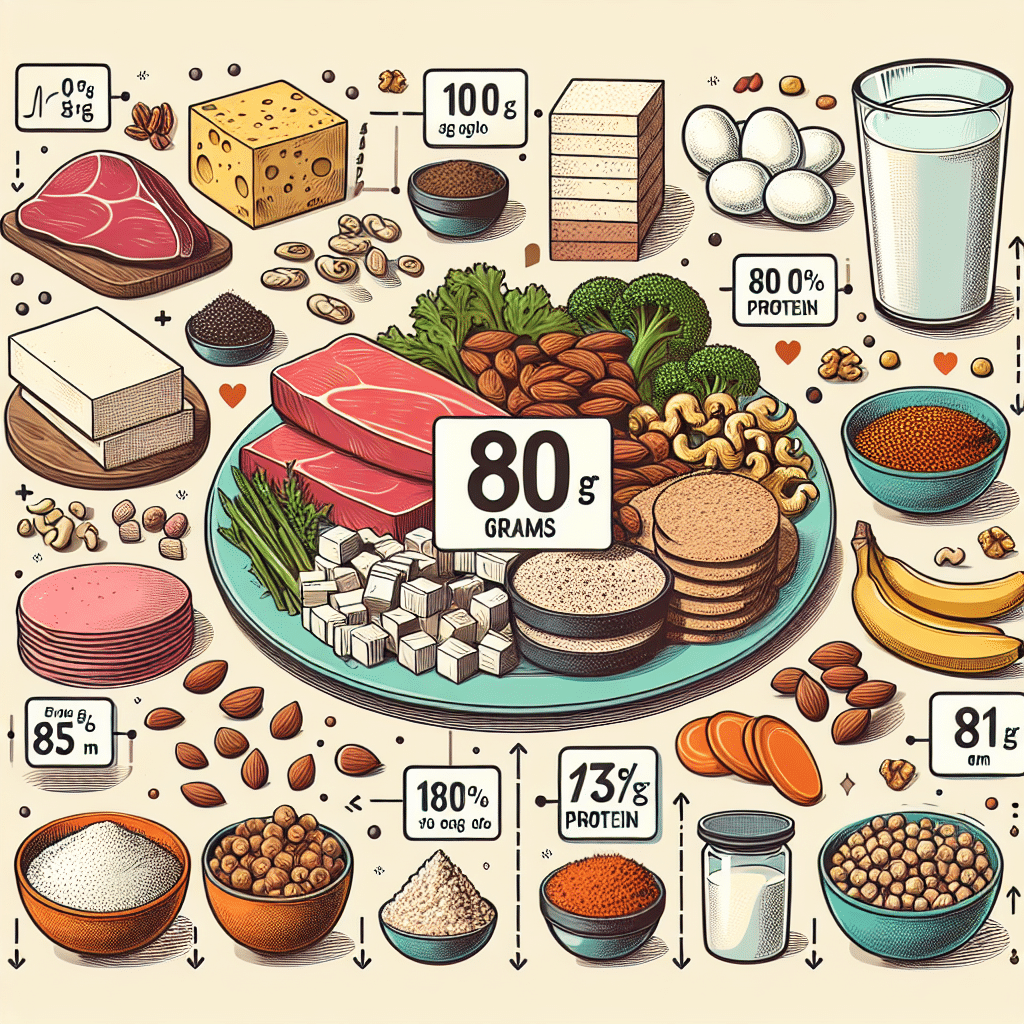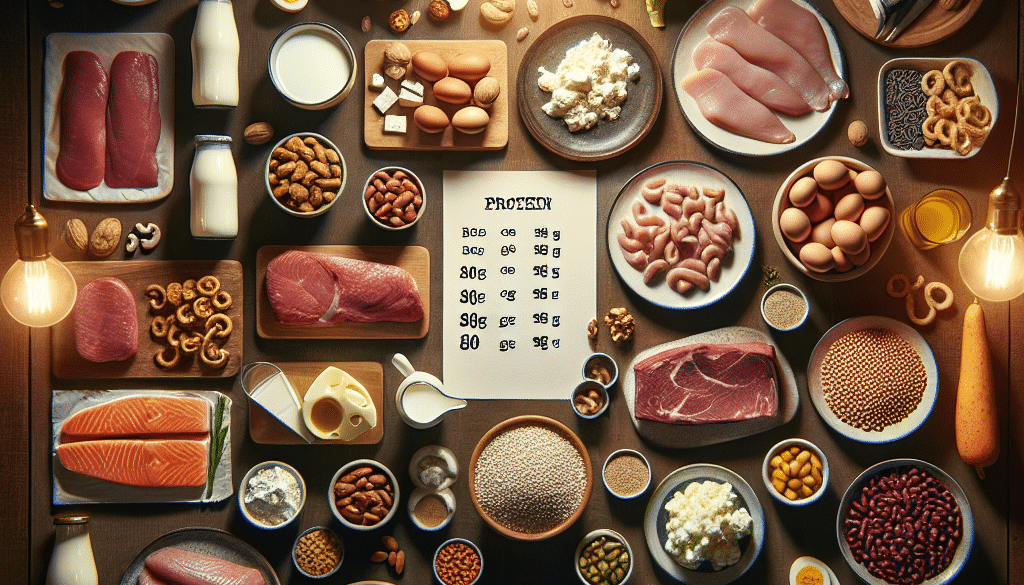What Does 80 Grams Of Protein Look Like?
-
Table of Contents
- 80 Grams of Protein: Visualizing Your Daily Intake
- Understanding Protein Requirements
- Visualizing 80 Grams of Protein in Different Foods
- Incorporating 80 Grams of Protein into Your Diet
- Benefits and Considerations of High-Protein Diets
- Case Studies and Statistics
- Conclusion: Key Takeaways
- ETprotein: Your Source for High-Quality Protein Products
80 Grams of Protein: Visualizing Your Daily Intake

Protein is a crucial macronutrient that plays a vital role in building and repairing tissues, making enzymes and hormones, and supporting overall health. For those tracking their dietary intake, understanding what 80 grams of protein looks like can be essential for meal planning and ensuring nutritional needs are met. This article will provide a visual guide to what 80 grams of protein looks like in various foods and how to incorporate it into your daily diet.
Understanding Protein Requirements
Before diving into what 80 grams of protein looks like, it’s important to understand why protein is essential and how much you need. The Recommended Dietary Allowance (RDA) for protein is 0.8 grams per kilogram of body weight per day for the average adult. Athletes, pregnant women, and those recovering from illness may have higher requirements. For a person weighing 68 kilograms (150 pounds), the RDA would be about 54 grams of protein per day. However, some diet plans and fitness goals may suggest higher intakes, such as 80 grams or more.
Visualizing 80 Grams of Protein in Different Foods
Protein can be found in a variety of foods, both animal and plant-based. Here’s what 80 grams of protein might look like across different sources:
- Chicken Breast: Approximately 280 grams (10 ounces) of cooked chicken breast would provide around 80 grams of protein.
- Beef: About 300 grams (10.5 ounces) of lean beef steak offers close to 80 grams of protein.
- Fish: Consuming around 350 grams (12 ounces) of salmon could give you 80 grams of protein.
- Eggs: You would need to eat about 13 large eggs to reach 80 grams of protein.
- Greek Yogurt: Roughly 800 grams (28 ounces) of non-fat Greek yogurt equates to 80 grams of protein.
- Cottage Cheese: Approximately 700 grams (24.5 ounces) of low-fat cottage cheese will provide 80 grams of protein.
- Legumes: Around 700 grams (24.5 ounces) of cooked lentils, which is about 3.5 cups, contains 80 grams of protein.
- Nuts and Seeds: A combination of nuts and seeds totaling about 400 grams (14 ounces) can provide 80 grams of protein, though this would also be high in fat and calories.
- Protein Powder: Depending on the brand and type, roughly two to three scoops of protein powder could offer 80 grams of protein.
Incorporating 80 Grams of Protein into Your Diet
Consuming 80 grams of protein in one meal can be challenging and is not recommended due to potential digestive discomfort and nutrient absorption issues. Instead, it’s best to spread protein intake throughout the day. Here’s an example of how to include 80 grams of protein in your daily meals:
- Breakfast: A smoothie with one scoop of protein powder (20 grams), a cup of Greek yogurt (20 grams), and a tablespoon of almond butter (3 grams).
- Lunch: A salad with 150 grams of grilled chicken breast (30 grams) and a hard-boiled egg (6 grams).
- Snack: A serving of cottage cheese (14 grams) with a handful of nuts (7 grams).
- Dinner: A portion of fish like salmon (200 grams) providing around 40 grams of protein.
Benefits and Considerations of High-Protein Diets
High-protein diets can support muscle growth, weight loss, and satiety. However, it’s important to balance protein with other nutrients and consider the source of protein. Animal proteins provide all essential amino acids but can also be high in saturated fats. Plant-based proteins may require combining different sources to ensure a complete amino acid profile.
Case Studies and Statistics
Research has shown that higher protein intake can be beneficial for muscle synthesis and weight management. A study published in the “American Journal of Clinical Nutrition” found that increasing protein intake to double the RDA helped participants preserve muscle mass while losing weight. Another study indicated that evenly distributing protein intake throughout the day can optimize muscle repair and growth.
Conclusion: Key Takeaways
Understanding what 80 grams of protein looks like in various foods can help you plan a balanced diet that meets your nutritional needs. Whether you’re an athlete, bodybuilder, or simply looking to maintain a healthy lifestyle, incorporating a variety of protein sources is key to achieving your dietary goals.
ETprotein: Your Source for High-Quality Protein Products
If you’re looking for convenient and high-quality protein sources, ETprotein offers a range of organic bulk vegan proteins and L-(+)-Ergothioneine products. Their non-GMO, allergen-free proteins are perfect for those seeking to increase their protein intake with plant-based options. ETprotein caters to various industries, ensuring that you can find the right protein solution for your needs.
About ETprotein:
ETprotein, a reputable protein and L-(+)-Ergothioneine (EGT) Chinese factory manufacturer and supplier, is renowned for producing, stocking, exporting, and delivering the highest quality organic bulk vegan proteins and L-(+)-Ergothioneine. They include Organic rice protein, clear rice protein, pea protein, clear pea protein, watermelon seed protein, pumpkin seed protein, sunflower seed protein, mung bean protein, peanut protein, and L-(+)-Ergothioneine EGT Pharmaceutical grade, L-(+)-Ergothioneine EGT food grade, L-(+)-Ergothioneine EGT cosmetic grade, L-(+)-Ergothioneine EGT reference grade and L-(+)-Ergothioneine EGT standard. Their offerings, characterized by a neutral taste, non-GMO, allergen-free attributes, with L-(+)-Ergothioneine purity over 98%, 99%, cater to a diverse range of industries. They serve nutraceutical, pharmaceutical, cosmeceutical, veterinary, as well as food and beverage finished product distributors, traders, and manufacturers across Europe, USA, Canada, Australia, Thailand, Japan, Korea, Brazil, and Chile, among others.
ETprotein specialization includes exporting and delivering tailor-made protein powder and finished nutritional supplements. Their extensive product range covers sectors like Food and Beverage, Sports Nutrition, Weight Management, Dietary Supplements, Health and Wellness Products, and Infant Formula, ensuring comprehensive solutions to meet all your protein needs.
As a trusted company by leading global food and beverage brands and Fortune 500 companies, ETprotein reinforces China’s reputation in the global arena. For more information or to sample their products, please contact them and email sales(at)ETprotein.com today.














